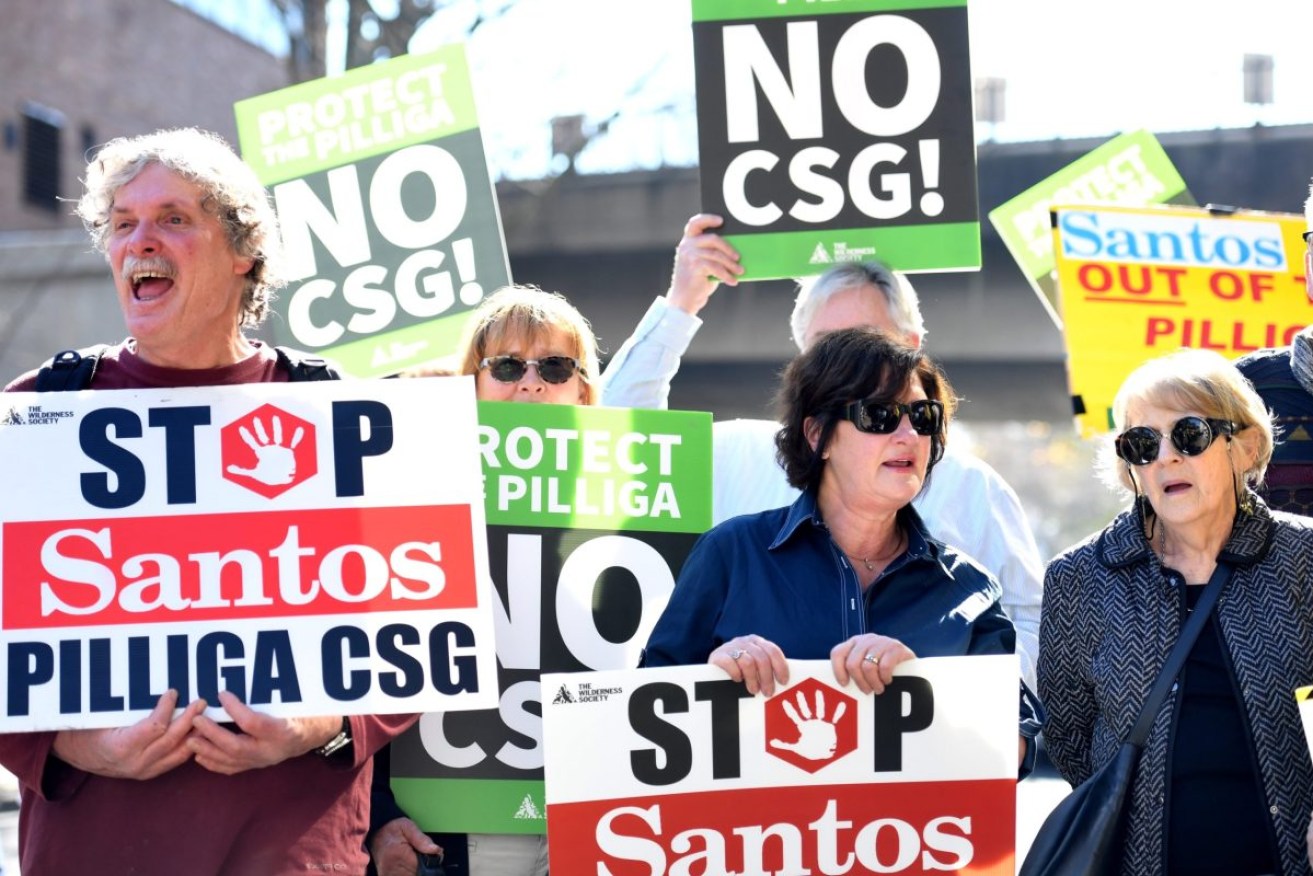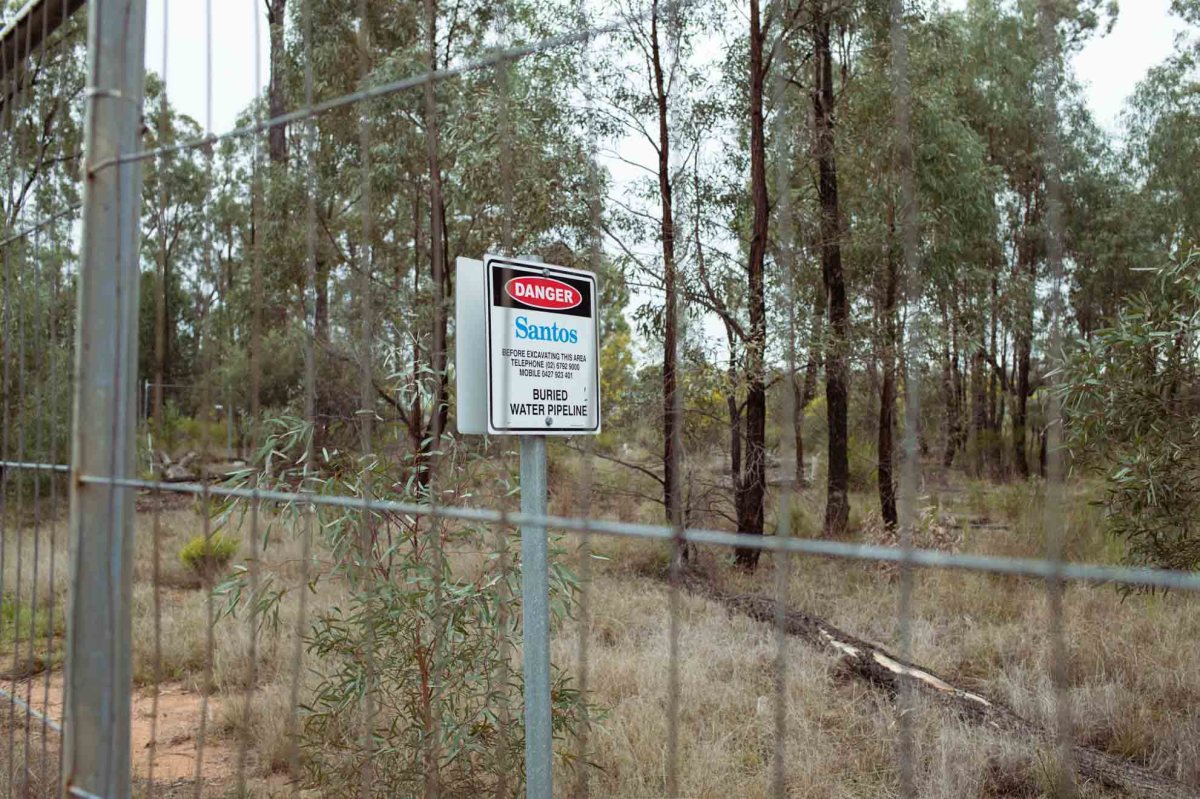Court rules against Santos gas project citing climate change considerations
Climate change should have been taken into account when deciding the future of a billion-dollar gas project undertaken by Adelaide-based oil and gas company Santos, the Federal Court has ruled.

A 2017 protest against the Santos Narrabri gas project. Photo: AAP/Paul Miller
In a decision handed down late Wednesday afternoon, the court held two-to-one that the Native Title Tribunal failed to consider how Santos’ $3.6bn Narrabri gas project may impact climate change as a matter of public interest.
The appeal was brought by the Gomeroi People, a New South Wales Indigenous community, who sought to challenge a 2022 decision by the Native Title Tribunal to allow the project to go ahead.
Under the company’s proposal, over 850 gas wells would be drilled across a 95,000-hectare area 500km north of Newcastle that includes the Pilliga scrub forest and nearby grazing land. There are already demonstration wells operating in the area.

The site of Santos’s Narrabri development. Photo: Isabella Moore
The project came to be considered emblematic of efforts by former Prime Minister Scott Morrison to push gas projects through approvals processes and has faced a decade-long campaign by the Gomeroi who are opposed to it going ahead.
In making their case to the Native Title Tribunal, the Gomeroi argued climate change should be considered when making any decision about whether to give the project a green light.
They were supported in their application by the late Australian National University Professor Will Steffen, a globally-respected climate scientist who contributed to work identifying climate “tipping points” which, if reached, trigger drastic and irreversible changes to climatic patterns.
In his initial decision, Tribunal President John Dowsett dismissed Steffen’s evidence as the opinion of “one scientist” and held that it was “for our political leaders” to decide how best to approach efforts to reduce greenhouse gas emissions as part of a broader fossil fuel phaseout needed to combat climate change.
However, Federal Court Chief Justice Debra Mortimer rejected this in her decision, finding the Tribunal should have considered the issue in the public interest, did have the power to veto a development on behalf of applicants and that it had shown “impermissible deference” to the New South Wales state government.
“It is within the Tribunal’s power under s38 of the NTA to decide that the future act ‘must not be done’,” Mortimer said. “It can be accepted that this power has not very often been exercise, and that it is a significant power, especially for a large project like the Narrabri gas project. Nevertheless, what is at stake for the native title party and their country is also significant.”
Dr Lily O’Neill, a legal expert and researcher with Melbourne Climate Futures from the University of Melbourne, said the decision was a “stunning win” for Indigenous communities.
“In the entire history of the Native Title Tribunal, they have only made a decision favouring Traditional Owners three times since 1994; they’ve made decisions in favour of the companies 149 times,” O’Neill said.
“The provision they’ve decided on almost always gets decided in favour of the company.
“It’s a huge win for Native Title holders. It’s an enormously difficult application for them to make.”
Gomeroi woman, Suellyn Tighe, who has been involved in the campaign against the Narrabri gas project for a decade, said she was hopeful the decision set a precedent.
“Lots of people are celebrating, and they should, but the fight isn’t over just yet,” Tighe said. “The decision’s come down and yes, we won, but there’s different pathways this could go.”
“It’s a great thing. I’m celebrating, but my guard’s up.”
Santos said it would continue to work through “land access, Native Title, pipeline licensing and remaining environmental approval process” on the Narrabri gas project.
“Santos will continue to engage constructively with the Gomeroi people and work closely with them to ensure their heritage is protected and they benefit from the project development, including through training and employment, and involvement in all aspects of cultural heritage protection and management,” it said.
The decision adds to the growing legal woes for Santos which also faced a major defeat when the Federal Court found the company had failed to consult Tiwi Island communities when attempting to get its $5.8bn Barossa gas project off the ground.
In the wake of this and other litigations, Santos has heavily lobbied the federal government to change regulations around Indigenous consultation and environmental approvals processes, particularly for offshore gas projects.
This comes amid growing lawsuits filed against fossil fuel producers overseas, seeking to hold companies to account for their contribution to climate change.
In one matter lodged in the United States in 2022, 16 Puerto Rican cities filed a racketeering lawsuit accusing ExxonMobil, Shell, Chevron and other major fossil fuel producers of colluding to downplay the risks associated with burning oil, gas and coal.
No similar suit has yet eventuated in Australia but according to a database kept by Melbourne Climate Futures, there have been 539 climate litigations across Australia as of 2024.




